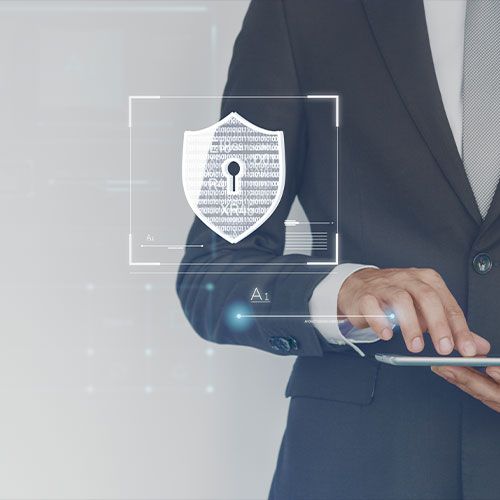The technique of protecting networks, computers, servers, mobile devices, electronic systems, and data from malicious attacks is known as cyber security.
Overview
We live in a digital era that makes life easy so why would we not rely on it. Starting from A to Z every profession and every work uses the internet. It is not exaggerated to state that every possible data is on the internet. An attack on this infrastructure might endanger not only consumer information or a company’s bottom line, but also the security, economy, public safety, and health of an entire country. These attacks are cyber-attacks. To save the data from a data breach, cyber security is indeed a requirement. cyber security guards data against data breaches. It included information, personally identifiable information (PII), protected health information (PHI), personal data, data pertaining to intellectual property, and information systems used by the government and businesses, also small businesses. Without a cybersecurity program, your business cannot defend itself against data breach operations, making it an unavoidable target for hackers. From cracking the password to keeping track of your every click and much more information can be accessed by third or fourth-party vendors.
Tendenze Emergenti nelle Scommesse Sportive in Italia Analizzate da Scommezoid
Le scommesse sportive rappresentano da sempre un fenomeno di grande interesse per gli appassionati di sport e per coloro che cercano un’emozione in più durante le competizioni. In Italia, il mondo delle scommesse ha vissuto negli ultimi anni un’evoluzione significativa, caratterizzata da tendenze emergenti e nuove dinamiche che stanno ridefinendo il panorama del settore. In questo articolo, esploreremo da vicino le Tendenze Emergenti nelle Scommesse Sportive in Italia, analizzate in dettaglio da Scommezoid, per comprendere meglio come stanno cambiando le abitudini e le prospettive degli scommettitori italiani.
Dalla crescente popolarità delle scommesse in modalità live al ruolo sempre più rilevante delle piattaforme online, passando per l’importanza delle statistiche e delle analisi approfondite, ci immergeremo in un viaggio attraverso le principali trasformazioni che stanno influenzando il mondo delle scommesse sportive in Italia. Cosa spinge gli scommettitori a preferire determinati tipi di scommesse? Quali sono le strategie vincenti in un contesto in continua evoluzione? Scopriremo insieme le risposte a queste domande e molto altro, per cogliere appieno il fascino e le sfide di un settore in costante mutamento.
Analisi delle Preferenze dei Giocatori in Italia
Le scommesse sportive in Italia stanno vivendo un momento di evoluzione e cambiamento, con tendenze emergenti che stanno ridefinendo il settore. Scommezoid, un’importante piattaforma di analisi nel campo delle scommesse, ha condotto uno studio approfondito sulle dinamiche attuali del mercato italiano.
Una delle tendenze più rilevanti individuate da Scommezoid è l’aumento dell’interesse per le scommesse in tempo reale. Sempre più scommettitori sono alla ricerca di esperienze di gioco più coinvolgenti e immediate, spinti dalla voglia di vivere l’emozione dell’evento sportivo in diretta. Questo trend sta influenzando sia le modalità di scommessa che le strategie adottate dagli operatori del settore.
Un’altra tendenza in crescita è l’utilizzo di dati e statistiche avanzate per supportare le decisioni di scommessa. Grazie all’accesso a informazioni sempre più dettagliate e aggiornate, i giocatori sono in grado di adottare approcci più razionali e mirati, aumentando le probabilità di successo. Scommezoid evidenzia come l’analisi dei dati stia diventando un elemento chiave per una scommessa consapevole e informata.
Infine, Scommezoid ha osservato un crescente interesse per le scommesse su eventi sportivi meno tradizionali, come eSports o competizioni di niche. Questa diversificazione dell’offerta riflette l’evolversi dei gusti e delle preferenze dei giocatori italiani, che cercano esperienze di scommessa sempre più personalizzate e adatte ai propri interessi specifici.
Impatto delle Tecnologie Innovative sul Settore delle Scommesse Sportive
Le tendenze emergenti nelle scommesse sportive in Italia stanno diventando sempre più evidenti grazie all’analisi approfondita condotta da Scommezoid. Il sito scommezoid.com si è distinto per la sua capacità di individuare e comprendere i cambiamenti nel panorama delle scommesse, offrendo agli appassionati un’analisi dettagliata e accurata.
Con un focus particolare sulle preferenze dei giocatori italiani e sulle dinamiche del mercato locale, Scommezoid ha contribuito a delineare le nuove direzioni che le scommesse sportive stanno prendendo nel paese. Grazie all’approccio innovativo e alle analisi basate sui dati, scommezoid.com si conferma come punto di riferimento per chi desidera rimanere aggiornato sulle ultime tendenze e sviluppi nel settore delle scommesse sportive in Italia.
Tendenze di Mercato e Modelli di Comportamento dei Consumatori
Le tendenze emergenti nelle scommesse sportive in Italia stanno subendo un’analisi approfondita da Scommezoid, uno dei principali portali online specializzati nel settore. Secondo i dati raccolti, si osserva un crescente interesse per le scommesse in tempo reale durante gli eventi sportivi, con un aumento significativo di scommettitori che preferiscono piazzare le proprie puntate mentre l’azione si svolge in diretta. Questa tendenza riflette la volontà dei giocatori di vivere un’esperienza più coinvolgente e immediata, spingendo le piattaforme di scommesse a potenziare le loro offerte in questo ambito.
Inoltre, Scommezoid ha evidenziato un incremento nell’utilizzo di scommesse virtuali e fantasy sports, che stanno guadagnando sempre più popolarità tra gli appassionati di scommesse sportive. Queste nuove modalità di gioco offrono agli scommettitori l’opportunità di sfidarsi in contesti alternativi, creando un’esperienza diversificata e coinvolgente. L’analisi condotta da Scommezoid conferma dunque che il panorama delle scommesse sportive in Italia è in costante evoluzione, con una crescente attenzione verso modalità di gioco innovative e dinamiche.
Ruolo di Scommezoid nell’Evoluzione del Mercato delle Scommesse Sportive
Le scommesse sportive in Italia stanno attraversando un periodo di evoluzione, con tendenze emergenti che stanno definendo il panorama attuale. Scommezoid, un’importante fonte di analisi nel settore, ha identificato alcune delle principali tendenze che stanno plasmando il mercato delle scommesse sportive nel paese. Una di queste tendenze è l’aumento della popolarità delle scommesse live, che offrono agli scommettitori la possibilità di piazzare puntate in tempo reale durante gli eventi sportivi, creando un’esperienza più coinvolgente e dinamica.
Un’altra tendenza rilevante è l’adozione crescente di tecnologie innovative nel settore delle scommesse sportive, come l’intelligenza artificiale e l’analisi dei big data. Queste tecnologie consentono ai bookmaker di offrire quote più precise e personalizzate, migliorando l’esperienza degli scommettitori e aumentando la competitività del mercato. Grazie all’analisi dettagliata condotta da Scommezoid, è possibile comprendere appieno queste tendenze emergenti e prepararsi per il futuro del settore delle scommesse sportive in Italia.
Le tendenze emergenti nelle scommesse sportive in Italia offrono uno spaccato interessante del panorama attuale, con l’avvento di nuove tecnologie e l’evoluzione dei gusti dei giocatori. L’analisi condotta da Scommezoid ha evidenziato come i consumatori italiani stiano sempre più apprezzando le scommesse in tempo reale e le opzioni di scommessa personalizzate. In un mercato in costante mutamento, è fondamentale per gli operatori rimanere al passo con queste tendenze per offrire un’esperienza di scommessa coinvolgente e all’avanguardia. Continuare a monitorare e adattarsi a queste dinamiche sarà essenziale per il successo nel settore delle scommesse sportive in Italia.
Why is cyber security necessary?
The one and the only reason is the increasing rate of cybercrime and information theft. They are evolving day by day, adopting new strategies, and a creative mindset breaks any unaware security code. The opportunity of cloud storage and other platforms exposed the data to attackers. This leads to so much damage so cyber security is most important here. Cyber security helps in building credibility over your business. As technology evolves, the dark web is not left behind. The dark web can be the reason for many illegal activities. It has given online criminals a safe refuge and raised the risk associated with using the surface of the Internet. The significance of cyber security has increased as a result of these vulnerabilities.
Common cyber threats include:
Malware attacks on computer systems that benefit attackers.
- Ransomware is a malware design that denies access to companies’ most important files on their computer and demands an amount of money to take the attack back.
- Botnet software is a collection of malware-infected Computer systems that a threat actor-run can completely manage the command and control center.
- RATs (remote access Trojans) is a malware design that permits attackers to control the infected computers.
- A rootkit has the unique feature of hiding its presence and can not be tracked by the user so it can hide malicious designs in the system without knowing that it can be very harmful.
- Backdoors refer to the method by which unauthorized users are able to root access a computer or network.
- Formjacking is a technique of cyberattack that involves hackers inserting malicious JavaScript code into a webpage form, most frequently a payment page form.
- Cryptojacking, a sort of cyberattack, is the practice of unintentional mining of digital currencies. The threat functions by installing a corrupted code on the target device and using its resources to mine unlicensed cryptocurrency.
- DDoS (distributed denial-of-service) attacks It is a type of cybercrime when the perpetrator saturates a server with internet traffic in an effort to keep people from accessing linked websites and online services.
- DNS (domain name system) poisoning attack is a technique for sending online traffic to a fake website that closely matches its real target by using updated DNS data.
When it comes to cyber security there is only one source to rely on Bitdefender.I would love to highlight some of the significant features of Bitdefender. They are really appealing and help you understand the ways Bitdefender uses to protect you from viruses.
Bitdefender
1. Bitdefender system optimization scans the system and removes all unwanted files.
2. It prevents hackers from remotely accessing your desktop. One unique feature is that it stops taking a snapshot and provides a password manager to protect the password, a virtual keyboard is simulated to avoid keystroke monitoring and activates built-in VPN security.
3. High-level encryption, Multi-device sync, Unlimited password storage, Payment information storage, Auto-save, auto-fill, and Password vault auditing.
4. VPN (a virtual private network) protects users’ online privacy and parental control.
5. Webcam Security & Microphone Protection.
6. Network Threat Prevention, Advanced Threat Defense, Multi-Layer Ransomware Protection, Vulnerability Assessment, and Web Attack Prevention.
7. Anti-Phishing/Web Protection Bitdefender’s anti-phishing software checks every page you visit against a database of millions of risky, blacklisted websites that is updated frequently. If a match is found and restricts access to the website.


